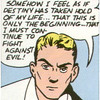Legacies
I am a huge history geek.
That shouldn't come as a surprise to any of you, really. Consider that my current position is as a graduate student. I'm so into history that I actually went back to school so I could study it.
My specialty is Japanese history, but I also love Chinese history and American history and British history. And Ancient Rome. And the Aztecs and the Mayans. But if I had my choice -- if I could really study any history I wanted -- I would study the history of the DC Universe.
Knowing that, you can imagine how much I enjoyed DC Universe Legacies #1. It's one of those books that seems to have been tailor made for me. It's got anything and everything a person like me could want out of a comic. History's grandeur. The birth of the super-hero. The awed eyes of those watching it happen.
I think this sense of history is what draws me to DC Comics more than anything else. That may also be part of the reason why I don't have much of an interest in Marvel Comics. Now, I'm not denying that Marvel Comics has some serious history. No on can doubt the importance of Golden Age characters like Captain America and Namor.
But most of Marvel's popular characters had their genesis not in the 1930's and 40's but in the 60's. There is almost fifty years of history there for most of them... But the big problem is that -- with a few exceptions -- there isn't really a sense of legacy in Marvel Comics. I don't get the feeling that there is a heroic tradition handed down from one generation to the next.
Now I maybe be wrong about that... But it doesn't really matter, does it? All I know is that DC does have those legacies. It may have begun with Superman and the Crimson Avenger, but it continued with Sandman, the Atom, Green Lantern, and others. And despite some of DC's recent decisions, I feel that the sense of legacy continues.
With every generation new heroes take up the cape and the mask. A young Paul Lincoln asked why they would put on masks and fight crime. Is it not self-evident? There was a need. And when such a need arises and all feels lost, there are always those men and women who will step forward. That's what Legacies is. It's the story of that tradition and the answer to the question. It's history.
Labels: DCU Legacies, Golden Age
 Name: Diamondrock
Name: Diamondrock
 Name: Azrael
Name: Azrael
 Name: Doctor Polaris
Name: Doctor Polaris
